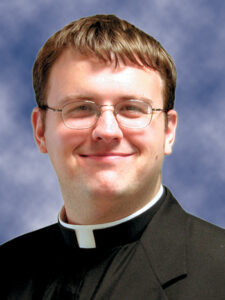 Dear Parishioners,
Dear Parishioners,
In Advent 2011, the Church produced a new translation of the Mass that we still use today. This translation has many benefits over the previous one. It is a more faithful translation of the original Latin and it does not simplify the theology in the text but maintains all the rich imagery. I am very glad that the Church went through such a great effort to translate the Mass so accurately. However, sometimes the meaning of the text can be somewhat obscure to the average Mass-goer and some explanation is needed to fully appreciate the depth of the text.
One example of this is a phrase that we hear often in mass, “And with your spirit.” This is the response to the priest when he says, “The Lord be with you,” at the beginning of Mass. In both phrases, the priest and the people are wishing that God remains with the other. But, why do they use different words to say this? After all, the previous translation simply reads, “And also with you.” This phrasing shows that God dwells in a special way with the priest at Mass. God is in the midst of the people because they make up His mystical body of Christ, the Church. They are members of the Church through their baptism and Christ is present wherever people gather in His name. (Matthew 18:20) The priest on the other hand, is an Alter Christus (“another Christ”) who is able to offer sacrifice as Christ does and he represents the people before God. So, God dwells in him through the spirit of his ordination which enables Him to say Mass. This exchange reminds the priest that he cannot offer the sacrifice without that grace from God. Another way of looking at it is that he does not take it upon himself to offer the holy sacrifice of the Mass, but asks the people to recognize that he may do so first. These words are said at the beginning of the Mass, at the Gospel (by the deacon), at the preface, partially at the sign of peace and at the final blessing to remind the priest that he is constantly praying for the people of God.
I think one of the reasons people do not like the new translation is because they do not like to hear that there is a distinction between the priest and the laity. They would prefer if everyone was the same in the Church and able to do the exact same things. However, there is nothing wrong with making distinctions with the body of Christ, which is the Church. As St. Paul reminds us, “As a body is one though it has many parts, and all the parts of the body, though many, are one body, so also Christ… If they were all one part, where would the body be? But as it is, there are many parts, yet one body.” (1 Cor 12:12-20) The Church does not need priests who pretend to be lay people and lay people who think they are priests but everyone working with their gifts for the good of the whole Church. On this day of Pentecost, the birthday of the Church, may we remember that it is the Holy Spirit that unites us, not what we do.
Peace,
Fr. Carter



